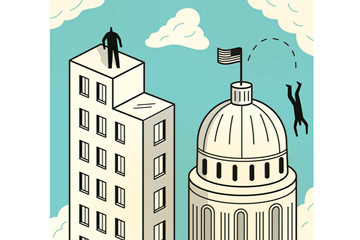
There is much that divides New York City and Washington: The cleanliness of the streets. Sartorial daring. And the view on whether or not we'll fall off the fiscal cliff by year's end. Wall Street, which bets on the future for a living, seems sure that Washington will come up with a solution. Markets rose as cliff negotiations between President Obama and congressional leaders commenced. While investors are worried about last-minute brinkmanship, the consensus has been that the stock plunge that would surely result is "hardly the holiday gift legislators will want to deliver to their constituents," as one major bank put it.
At the risk of grinching this party, I'm not so sure. There's an assumption that conservatives, chastened not only by Mitt Romney's loss but also by exit polls showing that voters blamed them for budgetary standoffs and the resulting economic damage, feel compelled to compromise on taxes, especially when it comes to raising rates for the rich. I've been inclined to believe it, largely because taxing the rich would underwrite enough social cohesion to enable the painful budget cuts and entitlement reforms needed to get the U.S. economy back on track. (For an example of what happens when you lack such social cohesion before attempting serious austerity, see Greece.) Wall Street clearly believes it too.
Then again, Washington exists on a different planet than Wall Street, and different laws of gravity apply. The first law is that while finance is global, politics is local. Wall Street looks at Europe and sees what three years of delays and half measures in dealing with the euro zone's budget crisis has wrought: another recession. Surely, the thinking goes, leaders in Washington won't let that happen here. But a new set of possibly more conservative House Republicans isn't looking across the Atlantic but across the streets of their home districts, where they'll face the next round of elections in two years. They may have taken some Wall Street campaign money, but they aren't taking orders from the Street on a debt deal, no matter what the markets do. "Policymakers aren't doing this with a sharp pencil. They are just worrying about slogans," says hedge-fund honcho Ray Dalio.
This underscores the second gulf between Washington and the Street: their time horizons. Sure, traders often bet on changes that happen within milliseconds. But the most successful ones have a worldview that spans centuries. Dalio, for example, is known for poring over hundreds of years' worth of financial history and decades of data, searching for patterns that mark the sea changes in economic cycles. At a recent event at the Council on Foreign Relations, he spoke about how the world could very well be entering a new era in which just getting our investment dollars back would be a big accomplishment. Avoiding that fate will require a delicate mix of job-creating spending, deficit reduction and smart monetary policy orchestrated over a decade. Politicians working on four-year election cycles have little impetus to make those changes fast enough or thoughtfully enough, as the past few years have shown.
